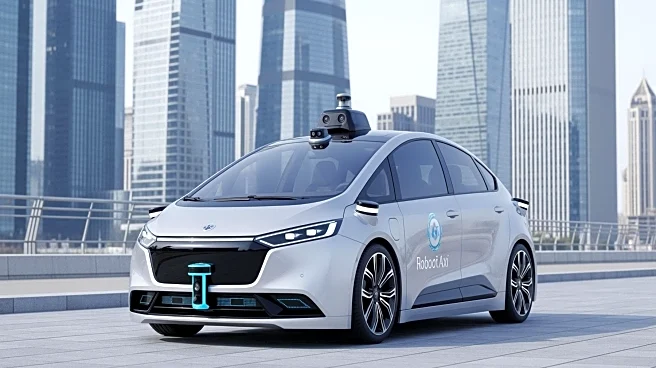What's Happening?
Chinese robotaxi companies, including Baidu's Apollo Go, WeRide, and Pony AI, are advancing their global commercialization efforts, outpacing American counterparts like Waymo. These companies are establishing
operations in international markets such as Singapore, Dubai, and Abu Dhabi, and are planning to expand into Europe. The Chinese government is actively supporting this sector, aiming to lead the world in autonomous vehicle technology by 2035. Despite regulatory challenges and competition, Chinese firms are leveraging their domestic electric vehicle industry and government backing to gain a competitive edge.
Why It's Important?
The expansion of Chinese robotaxi companies into global markets signifies a shift in the autonomous vehicle industry, challenging U.S. companies like Waymo and Tesla. This development could impact the global market dynamics, with Chinese firms potentially setting new standards in autonomous technology. The strategic support from the Chinese government highlights the importance of this sector in China's economic and technological ambitions. U.S. companies may need to accelerate their international strategies to maintain competitiveness, potentially influencing policy and investment decisions in the autonomous vehicle industry.
What's Next?
Chinese companies are expected to continue their aggressive expansion, with plans to launch services in Europe and further penetrate Middle Eastern markets. U.S. companies may respond by increasing their international presence and forming strategic partnerships to compete effectively. Regulatory bodies in various countries will likely play a crucial role in shaping the future of autonomous vehicle deployment, balancing innovation with safety and employment concerns. The ongoing competition could lead to technological advancements and new business models in the autonomous driving sector.
Beyond the Headlines
The rise of Chinese robotaxi companies could lead to ethical and employment challenges, particularly concerning the displacement of human drivers. The integration of autonomous vehicles into urban environments raises questions about data privacy, cybersecurity, and the societal impact of reduced human interaction in transportation. Long-term, this trend may influence urban planning and infrastructure development, as cities adapt to accommodate autonomous vehicles.










